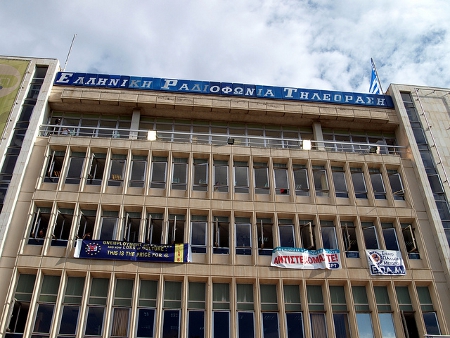Last week Greece experienced another political crisis. This year’s predicament — which for various reasons received much less international attention than the previous few — centred on the state broadcaster ERT. Just over a week ago, Prime Minister Antonis Samaras announced that it, and its three channels, would close down with immediate effect. ERT, which receives annual funding of €328 million (collected unusually via electricity bills), was a source of “incredible waste” and had to be drastically reformed.

Thus, the government
announced that 2,500 employees would lose their jobs (a figure which, after the
involvement of the unions, rose to 2,700) and that a pared down state
broadcaster would be introduced at a later, unspecified date. Cue howls of
anguish: “A blow to democracy” fumed ERT newsreader Antonis Alafogiorgos; an “institutional
coup” claimed leftwing opposition leader Alexis Tsipras.
Certainly, the shutdown
occurred at breakneck speed: ERT’s channels went black at 11pm on the day of
announcement (an anchor, it was reported, was cut off mid-sentence). Understandably, this inflamed both Greece’s
journalists and its opposition politicians. Indeed, ERT staff were so irate they
pledged to continue broadcasting come what may.
Intriguingly, their
white knight arrived in the form of the European Broadcasting Union (the folks
behind the Eurovision song contest). The EBU immediately expressed its “profound
dismay” at Samaras’ decision and moved a satellite truck into the ERT’s car
park in order to facilitate continued, online broadcasting. More, the EBU wrote
to the European Commission and also organised a letter of protest signed by the
great and good of European public service broadcasting, including the Director-General
of the BBC.
By Thursday the
pressure on Samaras had steadily ratcheted. It was beginning to look like he had
overplayed his hand. So outraged were the other political parties — including
PASOK and Democratic left, his coalitions partners — that it seemed as if fresh
elections might prove necessary.
This spooked both the
Germans and the market. Although Samaras only moved to close the broadcaster in
order to satisfy the demands of the Troika (which has called for the Greek
public sector to shed a further 2,000 workers), the alacrity with which the ERT
was taken off the air, combined with the lack of consultation, prompted a political
crisis.
By Friday the Prime
Minister had begun to row back. He signalled his intent to form a committee
which would entrust a small number of ERT employees to resume news broadcasts.
But for his opponents, rather predictably, the comprise measure did not go far
enough.
Over the weekend,
Samaras attacked the ERT as “sinful” and corrupt. He claimed that he was trying
to modernise a country that resembled “Jurassic Park”. But his justifications
fell on deaf ears. On Monday Greece’s highest administrative court, the Council
of State, suspended the order to closedown ERT. However, it did add that the
state broadcaster sorely required reform.
Although this caveat
allowed all sides to claim victory, in reality there can be no doubt that the
Prime Minister’s authority has been weakened. Indeed, Samaras has already
pledged to update the coalition agreement, to consult with his partners more
frequently and to engage in a Cabinet reshuffle.
What to make of all
this? Some have claimed the victor was Greek democracy, but I’m not so sure.
While the government clearly acted with undue haste, the scope of the ERT must
be put in perspective: its audience share, for instance, has been on the
decline for years and currently stands at 13%. Furthermore, Samaras was
attempting (albeit clumsily) to satisfy the demands of the Troika, not hobble
the Greek media.
And then there is the
role played by the EBU. Whether or not Samaras acted wisely (and I think we can
all agree he didn’t), his decision to close the ERT was undermined by an
unaccountable trade union. Not only did the EBU facilitate the aforementioned satellite
truck, but it actually enabled the ERT’s news channel, NET, to return to television
screens by rerouting its signal.
Quite rightly, the
Greek government has threatened the EBU with legal action (it has also been in
contact with Israel to protest the fact that a firm from that nation co-opted
with the EBU). Although it may have disagreed with the Greek government’s
decision, the lengths which it went to circumvent it are astonishing.
In essence, the
decision to close the ERT can be interpreted as a clumsy attempt to satisfy the
Trokia— the IMF, the ECB and European Commission. In other words, the Greek
government was bowing to its creditors demands. It is also true that the
decision was roundly attacked as an affront to democracy, and that the policy was
vehemently opposed by the EBU. In other words, the will of the Greek government
was undermined by pan-European organisation accountable to no one.
So I ask, is Antonis
Samaras the real threat to Greek democracy? I can’t help but feel that the past
week proves he isn’t.
No comments:
Post a Comment